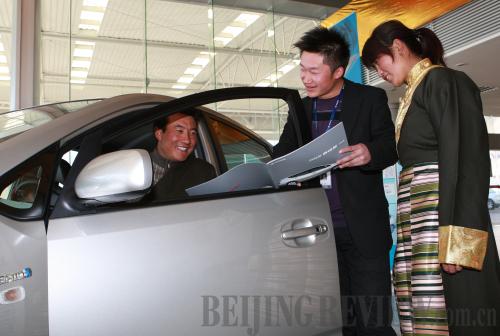|
 |
|
PURCHASE INCENTIVE: A Tibetan couple choose a car in Lhasa, capital of Tibet Autonomous Region (JIANG XIAOYING) |
China needs to both sustain growth and fulfill the task of economic restructuring. A research report by China International Capital Corp. Ltd. says the Chinese Government is issuing a series of macroeconomic measures, not only focusing on the short-term target of stabilizing economic growth, but also considering the long-term target of economic restructuring and transformation of the economic growth pattern. According to the report, among the projects approved by the NDRC this year, 78.8 percent will be in the public utilities industry, and 11.3 percent in information services.
Seeing from policies issued by various ministries and commissions to stabilize growth, whether subsidies for energy-saving air conditioners and flat-screen televisions or favored housing loans to purchase of green residential buildings, energy-saving and environment protection projects account for a large proportion.
Zhang thought during this round of measures to "stabilize growth," private investment will play a more important role. Several ministries and commissions have issued provisions for private capital to invest in monopoly industries, with unprecedented efforts to support private investment. Many experts say China's measures to stabilize growth will not reverse the strategic progress in transforming the growth pattern and economic restructuring, nor will they intensify the long-standing economic imbalance. The Chinese Government has set a bottom line for the measures of stabilizing growth this time: There will be no investment policies as strong as the 4-trillion-yuan stimulus package in 2008, and macro-control of the real estate industry will not be relaxed.
Public concerns
As China faces pressures of excessive capacity in its steel production, some large steel projects, such as those in Zhanjiang and Fangchenggang that have received NDRC approval, have aroused public concerns that the government is increasing investment blindly to ensure steady economic growth.
Zhang said undeniably, for the pursuit of economic growth, government-led irrational investment behavior is commonly seen. Excessive investment has led to surplus capacity in many industries and low investment returns. This has spread from traditional industries such as iron and steel and ship building to photovoltaic and some other emerging industries. Because of random investment, investment efficiency has dropped rapidly in recent years, so has the quality and returns of economic growth.
"We should not make random investment now with the excuse of stabilizing growth, which will impose bigger adverse impacts to future economic development," said Zhang.
Ba Shusong, Deputy Director of the NDRC Research Institute of Finance, said experiencing massive investment and slowed down economic development in 2008 and 2009, many industries now see a surplus capacity. Hence when making new investment, the government should avoid increasing investment in these industries to facilitate economic restructuring.
Ba thought the best way of investment is to appropriately accelerate construction of infrastructure projects, instead of putting more money into the iron and steel industry.
Zuo Xiaolei, chief consultant to the president of China Galaxy Securities Co. Ltd., said decisions of vision in both breadth and depth are needed to ensure steady growth and deal with the relationship between steady growth and economic restructuring. Otherwise, even though troubles at hand can be solved, more severe problems may be caused in the future.
According to Zuo, "stabilizing growth" is more important to stimulating economic growth, hence many suggestions carry on the ideas of rescuing the crisis, such as opinions of frequently cutting the reserve requirement ratio or relaxing the monetary policy, but inflation will then be inevitable. The Chinese economy has not yet emerged out of the haze of high inflation caused by the overflow of liquidity during 2009 and 2010. If relaxing the monetary policy again, the economy would get into more unstable circumstances. Therefore the government must be prudent in relaxing its monetary policy.
Zuo thought since the Chinese economy is now in a reasonable state of macro-control instead of crisis, it is unnecessary to massively overdraw money from the central bank to stimulate economic growth.
At present the biggest problem the Chinese economy faces is the declining investment demand, mainly caused by the reduction of investment in real estate, iron and steel, cement and other industries with surplus capacity, but it is a decline of ineffective investment. It indicates that to stabilize economic growth, the government needs to create new effective investment demand, such as investments in electronics, information technology and other strategic emerging industries, as well as service industries.
Email us at: lanxinzhen@bjreview.com | 